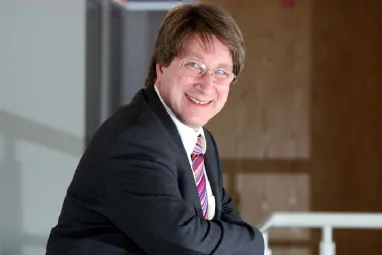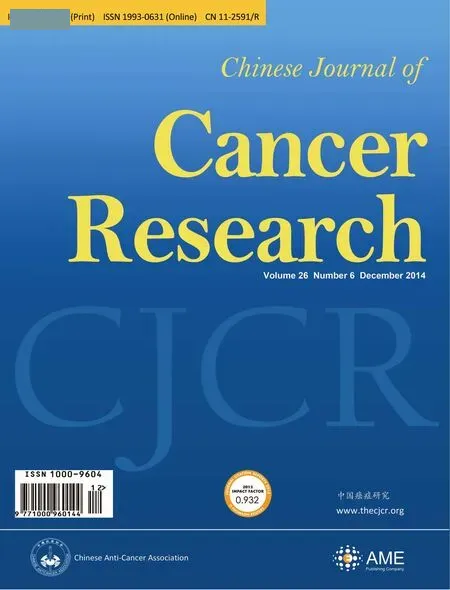Professor Malcolm Mason: what could we do against cancer?
Professor Malcolm Mason: what could we do against cancer?
Submitted Oct 17, 2014. Accepted for publication Nov 11, 2014.
View this article at:http://dx.doi.org/10.3978/j.issn.1000-9604.2014.11.06
During the 9thNational Gastric Cancer Academic Conference in Beijing, June 28th, 2014, the editor of Chinese Journal of Cancer Research (CJCR) had the honor of meeting Professor Malcolm Mason from Cardiff University School of Medicine and invited him to share his expert opinions about cancer staging and treatment for prostate cancer, as well as his experience of serving as director for Wales Cancer Bank.
Professor Mason (Figure 1) is a clinician who specializes in the management of urological cancers, in which capacity he is the Chairman of the UK National Cancer Research Institute’s Prostate Cancer Clinical Studies Group. He is an experienced Clinical Researcher, has been the Chief Investigator for a number of Medical Research Council trials. He Chairs the UK TNM Committee for the International Union Against Cancer (UICC), and sits on the Core Group and the Prognostic Factors Task Group. Since 2003 he has been the Director of the Wales Cancer Bank, the UK’s first population-based tumor and blood sample collection, which to date has recruited over 10,000 patients. He also has laboratory research interests in prostate cancer, focused on immunology and on cancer metastasis.
CJCR: It is really an honor to meet you today. To bene fi t readers who could not be here today for your presentation, could you give us a brief summary of the signi fi cance of clinical stage for gastric and other cancers with experience from Wales and from the International Union Against Cancer (UICC)?
Prof. Mason:It was an honor for me to have had the opportunity to present to the conference. I spoke about the reasons why cancer patients should be staged accurately, which we regard as an essential pre-requisite to the selection of the best form of treatment for that patient. It is also important that, as an international community, we speak the same language, and that is the underlying rationale for the UICC TNM programme. We want to see the time when a patient with gastric cancer will be staged using the same system, whether he lives in Cardiff, Beijing, or New York. Enormous strides have been made towards this goal, and I want to pay tribute here, as I did at the conference, to the huge amount of work that has been done in China. Finally, I spoke about the need, not only to perform staging, but also to record it accurately. For us in Wales, this is an area in which, though it is improving rapidly, needs a lot more work. Only by doing this can we understand why mortality data vary over time—both within one country, and as a comparison between countries. This will give us insights into the effectiveness of public health measures such as prevention and screening, as well as inferring the quality of treatment received.

Figure 1Professor Malcolm Mason.
CJCR: Why would you be interested in cancer staging?
Prof. Mason:My main research interest is in prostate cancer, but I’m very interested in cancer staging. I work with the UICC and I am a member of the Core group. I also chair the UK National TNM Committee, which is one of a number of national committees (include the Chinese TNM committee). It started in 2013 and is very successful. Under the umbrella of the UICC, we of course look at all cancers. So I know most about the urological cancers but we really do consider the problems with all of them. And it was also an opportunity for me to look at the slightly wider problem of how we record stage. It is not just when patientshave an initial diagnosis, when they have investigations, and have their disease staged and treatment allocated, but as I said above, it is a question of recording it. And in the UK, I think, increasing worldwide, cancer registries are becoming able to record tumor stage. That is very important and is going to be the best way to get good national and international data.
CJCR: Speaking of prostate cancer, you are a pioneer in exploring radiotherapy combing with hormone therapy as treatment for prostate cancer. Are there any updates on implementing radiotherapy and hormone therapy into treatment recommendations?
Prof. Mason:No, we have now done the final analysis, which was presented recently at ASCO. It confirms the findings previous interimanalysis. The bottom line is that in locally advanced prostate cancer, adding radiotherapy to hormone therapy reduces the chances of dying of the disease by about half. So that is quite a large difference. Of course, we are very mindful that it is not a perfectsolution to the problem, because there are many patients who still died even though they had the combination of hormone therapy and radiotherapy. So the next study is the one called STAMPEDE, which is run by the Medical Research Council in the UK. Essentially, it is looking at hormone therapy (with or without radiotherapy depending on the patient’s stage), asking the question of whether we add some other systemic therapy to the hormone therapy. These treatments include docetaxel chemotherapy, Zoledronic acid, or more recently Abiraterone or Enzalutamide. Currently, we are also looking at the question whether it is benefcial to give radiation to the primary in the patient who has metastatic disease, which is a very unusual and interesting question to me. We may see some results from next year. Currently, this trial has recruited 5,400 patients, so we think it is the largest prostate cancer trial in history.
CJCR: Apart from radiotherapy, chemotherapy and hormone therapy, we have the immunotherapy. It is a really hot topic these years, either in AACR or ASCO annual meetings. What do you think about that?
Prof. Mason:I think that immunotherapy really does have a future. We are waiting for a result of one of the more advanced treatments from a large phase III study of the tasquinimod. Tasquinimod is a very complex drug and has a lot of actions. But the main action is as an immunotherapeutic drug. There are other immunotherapeutic agents. PD-1 is one of these immunecheckpoint inhibitors. Personally, I am sure they will have a future in prostate cancer and in gastric cancer. The challenge is to work out which inhibitors are needed by the patients, and to which inhibitor are the patients most likely to respond. And that brings onto another question: stratifed medicine, and how we move from the way we treat every patient in the same way and the future, where we look at the patients’ molecular characteristics and select the treatment based on that.
CJCR: Could we call that personalized treatment?
Prof. Mason:Yes, the public like to call it personalized medicine. But we tend to call it stratified medicine or precision medicine. Simply because you have a hundred different cancer patients, probably we won’t have a hundred different treatments. We may have 8 or 9 or 10 different treatments because we put patients into groups. That’s why we prefer the terminology ‘Stratifed Medicine’.
CJCR: As the Director for Wales Cancer Bank, the UK’s fi rst population-based tumor and blood sample collection, what is the signi fi cance of collecting all of these?
Prof. Mason:Over the last ten years, the bank has been in a phase where it is a like savings bank. We have got these samples with consent from 10,000 patients in Wales, either blood samples or tumor samples or both and to have them stored for future years. At the time of collecting tumor, we may not know what the best question is. We may not know the right question to ask. The important thing is to collect the tumor and very importantly to collect the clinical information. In this way, when we look back over 10 or 20 years, we can see how the diseases behave and we can relate that back to changes. We are actually starting on the next phase of this: the molecular analysis. We have done a molecular analysis of some of our patients with colorectal cancer and are in the process of looking for some breast cancer patients. To look at some of the common gene mutations, such as KRAS, BRAF and so forth, I think that’s going to be the next exciting phase. But it is very important to link that back to the patient outcomes. For example, my dream is that somebody will say “hey, we want to look at patients who had KRAS wild-type colon cancer, treated with Cetuximab and relapsed in lymph node only after fve years”. Who has that information? Maybe we will.
CJCR: How many patients do we have in this database now?
Prof. Mason:A total of 10,000 patients. Most of the patients are with the common cancers we see in the UK. Those are breast, prostate cancer and colorectal cancer. For lung cancer, we have less, only because we started the lung cancer collection rather late, much later than the others. We will have a very large lung cancer collection later. It is very exciting.
CJCR: Can this kind of organization be learned by China or by other countries?
Prof. Mason:I think in some respects, it has been modeled. Of course I know that in China there are some very extensive tumor collections. What I would really like to see is some international collaboration so that we can look at the same tumor type. I asked the question in my lecture: “Is the biology of gastric cancer in Wales and in China, the same?” Maybe it is. I don’t know. You don’t know. Nobody knows. Nobody has looked at it. Maybe it is the same. That’s fne, and in itself that would be interesting because it is the same despite the fact that we have different environmental conditions, very different diet and so on. If it was different, that’s even more interesting because what does that teaches us about the disease. That‘s one of the reasons why we set it up. We really would like to do this.
CJCR: I wish to see it happen in the future. Thank you very much for sharing with us.
Acknowledgements
Disclosure: The authors declare no confict of interest.
(Science editors: Eunice X. Xu, Yongshi Jiang, CJCR, editor@thecjcr.org)
Cite this article as:Xu EX, Jiang Y. Professor Malcolm Mason: what could we do against cancer? Chin J Cancer Res 2014;26(6):737-739. doi: 10.3978/j.issn.1000-9604.2014.11.06
10.3978/j.issn.1000-9604.2014.11.06
 Chinese Journal of Cancer Research2014年6期
Chinese Journal of Cancer Research2014年6期
- Chinese Journal of Cancer Research的其它文章
- Endobronchial ultrasound-guided transbronchial needle aspiration: unraveling myths of mass in the chest
- Next generation sequencing, inter-tumor heterogeneity and prognosis of hepatitis B related hepatocellular carcinoma
- Endoscopic ultrasonography: an advancing option with duality in both diagnosis and treatment of gastrointestinal oncology
- Use of endoscopic ultrasound-based techniques in tumor of the guts and beyond
- Quantitative index calculated by99mTc-GSA scintigraphy
- New ‘multi-omics’ approach and its contribution to hepatocellular carcinoma in China
